In a surprising turn of events, former President Donald Trump has made a significant adjustment to his earlier aggressive trade policies. Just over 12 hours after implementing his so-called “reciprocal” tariffs—an approach aimed at counterbalancing what he deemed unfair trade practices by other nations—Trump has opted to pause most of these tariffs for a period of 90 days. This decision signals a potential shift in strategy regarding international trade relations, which have been a cornerstone of his administration’s economic philosophy.
Trump’s reasoning behind this suspension stems from the active engagement of more than 75 countries in negotiations with his administration. Acknowledging the shared efforts to address America’s longstanding complaints about global trade practices, he appears to be responding to the international dialogue and cooperation that has arisen in light of his tariff initiatives. The outreach from these nations suggests a willingness to discuss and potentially amend trade agreements that could better serve American interests without resorting to harsh economic measures.
Additionally, the turbulence felt within the Treasury market may have played a vital role in Trump’s decision. The immediate reaction from various financial markets upon his announcement was one of relief; stock indices and commodity futures experienced noteworthy surges. This positive response from the markets likely tempered the fears that had been rampant about the potential economic fallout from the swift implementation of hefty tariffs.
The timing of Trump’s 90-day pause is critical—not just from an economic standpoint, but also in the broader context of his administration’s approach to international relations. Trade wars can lead to retaliatory measures from other countries, which could spiral into a vast economic downturn. By taking a step back, Trump appears to acknowledge the delicate balance that must be maintained in international trade and the economic ramifications that could arise from aggressive policies.
Moreover, Trump’s willingness to pause the tariffs indicates a nuanced understanding of the interconnected nature of global economies. As businesses and investors reacted positively, this reflects a growing concern that prolonged trade conflicts could disrupt supply chains and increase uncertainties within the market. The lifeline granted by Trump’s decision to delay the tariffs may foster a more conducive environment for negotiations moving forward, encouraging all parties involved to explore solutions that circumvent further escalation.
The immediate aftermath of the tariff suspension witnessed a wave of optimism. Analysts and experts in economic policy speculate that the pause could pave the way for more constructive discussions between the United States and its trading partners. It illustrates Trump’s potential capacity to adapt his strategies in response to varying economic indicators and international sentiments.
Moreover, this development prompts a deeper examination of the underlying issues in global trade since the imposition of tariffs has always been a contentious subject. While Trump’s administration initially framed the tariffs as a necessary tactic to protect American jobs and industry, the conversations that are now unfolding suggest a willingness to collaborate rather than confront.
In conclusion, Donald Trump’s decision to pause most of the recently enacted tariffs for 90 days appears to be a strategic recalibration aimed at fostering dialogue with global partners. This shift not only alleviates immediate financial concerns but also reflects a recognition of the complexities involved in international trade. As countries engage in negotiations to resolve trade disputes, the broader implications of this pause could reshape the economic landscape, encouraging a cooperative rather than adversarial approach to trade policies that benefit both the United States and its allies.









